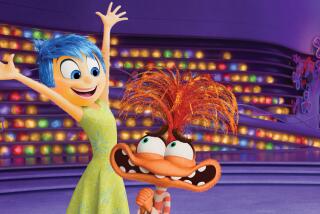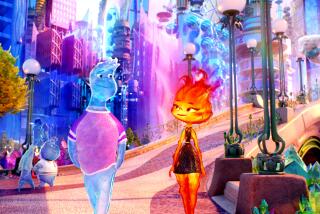Long and short of Pixarâs success
Twenty-two years ago, computer animation was just a byte in Pixar guru John Lasseterâs eye. Now, heâs the director of âCars,â âToy Storyâ and âToy Story 2,â not to mention the new animation chieftain of the Walt Disney Co. But back then, he was just a young animator whoâd been canned from the Mouse House and had started working at George Lucasâ Industrial Light and Magic, the special-effects powerhouse.
Lasseter tested out his interest in the fledgling medium of computer animation with a two-minute short, âThe Adventures of Andre & Wally B,â about a Pinocchio-like creature whoâs menaced by a bee, all to the tunes of Mozart.
Soon after, Apple computer founder Steve Jobs bought Lucasâ animation division for $10 million and christened it Pixar. The companyâs first film effort -- made by Lasseter and pals -- was the short âLuxo Jr.â In three minutes of relatively simple animation, Lasseter was able to anthropomorphize a white office lamp and a saucy mini-lamp. The little lamp squashes a bouncing ball, much to the big lampâs dismay. He took his new creation to Siggraph, the annual computer graphics conference.
âHe knew heâd managed to tell a good story when some of the audience members came up later and asked whether the big lamp was a Mommy lamp or a Daddy lamp, rather than how the algorithms were done. They knew theyâd made a breakthrough on the computer,â says Osnat Shurer, head of Pixarâs short film group, which like Pixar itself is now part of Disney.
The Luxo lamp is now the Pixar mascot. It hops on top of the letter I whenever the Pixar logo is shown.
Today, the Los Angeles Film Festival presents âLuxo Jr.,â âThe Adventures of Andre & Wally B.â and a raft of other Pixar shorts, including charming doodles with signature Pixar characters such as Mike from âMonsters, Inc.â and baby Jack Jack from âThe Incredibles.â Part of Pixarâs 20th anniversary celebration, the shorts program is a whirlwind tour of the animation houseâs rapid-fire technological and storytelling growth with such highlights as âBoundinâ,â about a bounding, dancing desert sheep; âGeriâs Game,â about an old man playing a maniacal game of chess; and âOne Man Band,â a mesmerizingly beautiful and amusing film about two Renaissance-era street musicians duking it out musically. Each plays fantastically elaborate instrument-contraptions that marry various woodwinds, violins, horns and drums.
The shorts arenât just in Pixarâs past tense. The studio continues to make shorts to run in front of all its films, as well as extras for DVD releases. The company uses the medium as a training ground for rising animators, letting them take leadership positions on the smaller projects, and as spots to perfect new tropes in animation.
Although the shorts donât require the years and years it takes to make a film such as âCars,â theyâre hardly dashed off.
The five-minute short âOne Man Band,â which has been playing in theaters in front of âCars,â took nine months. It was written and directed by Mark Andrews and Andrew Jimenez, two proteges of âThe Incrediblesâ director Brad Bird.
Unlike most animated films, this one had to be scored before it could be animated. Says Shurer, who produced the film, âWe had someone in L.A. shooting close-ups of musicianâs fingers as reference for the animators, so they could see what it was going to look like when the hands move on the violins.â
More to Read
Only good movies
Get the Indie Focus newsletter, Mark Olsen's weekly guide to the world of cinema.
You may occasionally receive promotional content from the Los Angeles Times.










